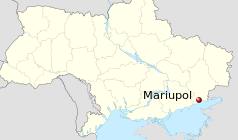Late last week, reports starting in the New York Times and quickly picked up across the world declared the major Ukrainian port city of Mariupol, part of the Donetsk Oblast, had been taken over by steelworkers, ordered there by an oligarch loyal to the central government, who had “routed” the protesters from the city.
 The story turns out to be a lot less cut and dry than that, and in the days that followed, the New York Times report continued to be repeated, but without any corroboration on the ground, while others reporting from the city weren’t noticing anything like a steel magnate takeover.
The story turns out to be a lot less cut and dry than that, and in the days that followed, the New York Times report continued to be repeated, but without any corroboration on the ground, while others reporting from the city weren’t noticing anything like a steel magnate takeover.
Steel workers are very much a thing in Mariupol, but don’t seem to be acting as any kind of ruling force, let alone an anti-protester force, as the latest reports point to a city still very much out of control, with the steel workers and others trying to help the police prevent looting during the day, but losing all pretense of order at night.
Police stations are smashed up, city hall is burnt to the ground, and protesters remain in Mariupol, though they don’t seem any closer to controlling the city than anyone else is, and Mariupol seems to be the very picture of a “contested city.”


